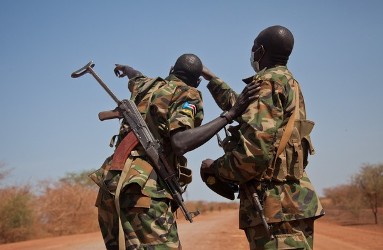S. Sudan raises concerns over “unusual” movement of Sudanese army
August 21, 2014 (JUBA) – The South Sudanese army expressed concerns today over what it described as the “unusual” movement of the Sudanese Armed Forces (SAF) within its territory amid signs of brewing tension between the two countries.

The officer, who is not authorised to speak to the media, said the presidency was furnished with a “detailed report”, documenting activities considered to be in breach of the 2012 security deal.
“The office of the president has been furnished with the detailed report documenting all the activities I think constitutes a clear breach of the cooperation agreement, specifically the security arrangement which was part of the general accord”, he observed.
Bol Makueng, a senior South Sudan ruling party (SPLM) official recently claimed the country’s former vice president-turned rebel leader, Riek Machar was in Khartoum to seek support from the Sudanese government.
His comments follow calls from South Sudan urging the government of neighbouring Sudan, from which the South seceded in 2011, to sever all ties with pro-Machar rebels.
However, Sudan denied it was providing military support to South Sudanese rebels who have been engaged in an armed struggle with the government since mid-December of last year when the conflict erupted following a political dispute in the ruling party of the SPLM.
The spokesperson for the Sudanese army, Colonel al-Sawarmi Khaled Sa’ad, maintained last week that a recent two-day visit by the rebel leader to Khartoum came within the framework of Sudan’s mediation efforts aimed at ending the crisis.
The South Sudanese government, however, fell short of directly accusing Sudan of supporting rebel forces, describing it as one of the key players in the ongoing peace process.
Military officers from the fourth division headquarters in Unity state disclosed recently that youth groups in the area spotted two Sudanese soldiers attempting to cut wires and extension cables used by companies within the oil fields. Unity state officials, including the deputy governor, Stephen Mabek Lang, also confirmed the incident.
The soldiers were later flown to the capital, Juba, but their fate remains unknown with observers saying Juba preferred diplomacy on the matter to ensure Khartoum remained neutral in its ongoing conflict.
But whereas the 2012 cooperation agreement allows Juba to use Sudan’s pipelines to export its oil to international markets, Khartoum is impatiently growing irritable of Juba’s behavior, especially with Uganda’s army involvement in the conflict against Machar.
Sudan has long accused the Ugandan government of supporting anti-Khartoum rebel groups while Kampala, on the other hand, believes Khartoum is providing support to the rebel Lord’s Resistance Army (LRA).
(ST)
